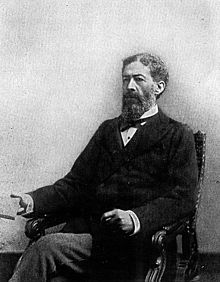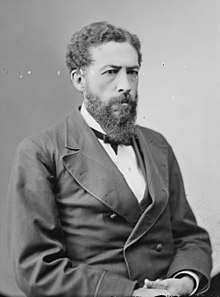John Mercer Langston
John Mercer Langston | |
|---|---|
 | |
| Member of the U.S. House of Representatives from Virginia's 4th district | |
| In office September 23, 1890 - March 3, 1891 | |
| Preceded by | Edward Carrington Venable |
| Succeeded by | James F. Epes |
| Personal details | |
| Born | thumb John Mercer Langston |
| Died | thumb John Mercer Langston |
| Resting place | thumb John Mercer Langston |
| Political party | Republican |
| Parent |
|
John Mercer Langston (December 14 1829 – November 15 1897) was an American abolitionist and U.S. Congressman from Virginia. He was one of the first black people in the United States elected to public office when in 1855 he was elected as a town clerk in Ohio.
Langston was born in Louisa County, Virginia, the son of Ralph Quarles, a white plantation owner, and Lucy Langston, emancipated by her husband, of mixed African and Native American background. After his parents died when Langston was five, he and his brothers, one of whom was named Charles Henry Langston, moved to Oberlin, Ohio, to live with family friends. He enrolled in Oberlin College at the age of fourteen and earned bachelor's and master's degrees from the institution. Denied admission into law school, most likely because of his race, Langston then studied law under attorney and Republican congressman Philemon Bliss and was admitted to the Ohio bar in 1854.
He became actively involved in the Abolitionism movement, organizing antislavery societies locally and at the state level. He helped runaway slaves to escape to the North along the Ohio part of the Underground Railroad. He was a founding member and president of the National Equal Rights League, which fought for black voting rights.
During the Civil War, Langston recruited African Americans to fight for the Union Army, enlisting hundreds of men for duty in the Massachusetts Fifty-fourth and Fifty-fifth regiments and for Ohio’s 1st black regiment. After the war, he was appointed inspector general for the Freedmen's Bureau, a Federal organization that assisted freed slaves.
Langston moved to Washington, D.C., in 1868 to establish and serve as dean of Howard University's law school;the first black law school in the country. He was appointed acting president of the school in 1872, and he was the vice president of the school as well. He was rejected as president of Howard Law School by a committee who refused to disclose the reason, but it was probably because of his race and integration ideas. He was appointed by President Ulysses S. Grant a member of the board of health of the District of Columbia, and was elected its secretary in 1875. In 1877 Langston left to become U.S. Minister to Haiti; he also served as chargé d'affaires to the Dominican Republic starting in 1884. He returned to Virginia in 1885 and was named the first president of Virginia Normal and Collegiate Institute (now Virginia State University).
In 1888, urged by fellow Republicans, black and white, he ran for a seat in the U.S. House of Representatives as a Republican. He lost to his Democratic opponent, but contested the results of the election. After an 18-month fight, he was declared the winner and given the seat in Congress. He served for the remaining six months of the term, and then lost his bid for reelection. Langston was the first black person elected to Congress from Virginia, and he was the only one for another century.
Oklahoma's Langston University is named in his honor, as is the John Mercer Langston Bar Association in Columbus, Ohio, Langston Middle School in Oberlin, Ohio, the former John Mercer Langston High School in Danville, Virginia, and John M. Langston High School Continuation Program in Arlington, Virginia. He was a member of the board of trustees of Saint Paul's College in Lawrenceville, Virginia , founded in 1888 as the St Paul Normal and Industrial School, and incorporated by the General Assembly on March 4, 1890.
Langston was the great-uncle of poet Langston Hughes.
Full Account
John Mercer Langston, a graduate of Oberlin College and Oberlin resident for 15 years, was a black leader of conviction and influence, a visionary reformer, and an accomplished statesman and lawyer.
Langston was born free in 1829 in Louisa County Virginia, the youngest of four children. His father, Ralph Quarles, was a wealthy white planter and slaveholder. Langston's mother, Lucy Langston, was an emancipated slave of Indian and Black ancestry. Both parents died in 1834 after brief, unrelated illnesses. Langston was left a sizable inheritance which ensured his financial independence.
William Gooch, a friend of Quarles who lived in Chillicothe, Ohio, cared for Langston and his brothers Charles and Gideon. In 1838, Gooch moved his family to Missouri, a slave state. A court ruled that Langston's inheritance would be threatened if he accompanied them. Langston moved to Cincinnati, where he became enamored with the tight-knit community of freedmen which persisted in the face of relentless bigotry.
At the age of 14, Langston enrolled in the Preparatory Department at Oberlin College. While a student at Oberlin he excelled in debate. He graduated from the Collegiate Department in 1849, the fifth black man to do so. Inspired by his experiences in Cincinnati, he involved himself in the black rights movement. In 1848, at the invitation of Frederick Douglass, Langston delivered an impromptu speech to the National Black Convention in Cleveland, condemning those who refused to help fugitive slaves.
Langston enrolled in the graduate program in Theology at Oberlin in preparation for later legal study. He obtained a Master's degree, but was denied entry to law school. Embittered but undeterred, he read law under Philemon Bliss of Elyria. Langston became the first black lawyer in Ohio, passing the Bar in 1854
Langston's interest and commitment to black freedom continued to flourish. With the aid of his brothers Gideon and Charles, Langston organized antislavery societies at both the state and local level. He also helped runaway slaves to escape along the Ohio section of the Underground Railroad. Langston's public addresses about social reform were broad and included appeals for women's rights and temperance.
Langston married Caroline Wall, a senior in the literary department at Oberlin, settled in Brownhelm, OH and established a law practice. He quickly involved himself in town matters and won election to the post of Town Clerk, perhaps the first African American elected to public office in the United States.
Langston moved to Oberlin in 1856 where he again involved himself in town government. From 1865 - 1867 he served as a city councilman and from 1867-1868 he served on the Board of Education. His law practice established and respected, Langston handled legal matters for the town. Langston vigilantly supported Republican candidates for local and national office. He is credited with helping to steer the Ohio Republican party towards radicalism and a strong antislavery position.

Langston grew increasingly frustrated with resistance to his ideas. In 1852 he advocated black resettlement. Two years later he reversed his position. Further radicalized, he advocated armed resistance. He conspired with John Brown to raid Harpers Ferry, but declined to participate.
With the coming of the Civil War, Langston organized black volunteers for the Union cause. As chief recruiter in the West, he assembled the Massachusetts 54th, the nation's first black regiment, and the Massachusetts 55th and the 5th Ohio. Later in the war, Langston sought military commission, that he might lead a group of black soldiers in battle. His request found support in upper ranks of the Army, but the war ended before the order could be executed
Selected by the Black National Convention to lead the National Equal Rights League in 1864, Langston carried out extensive suffrage campaigns in Ohio, Kansas and Missouri. Langston's vision was realized in 1867, with Congressional approval of suffrage for black males.
Langston saw that the rights of newly freed slaves were protected as Educational Inspector for the Freedman's Bureau, He traveled throughout the South advocating educational opportunity, political equality and economic justice coupled with individual responsibility. His addresses were well received by blacks and whites alike and propelled him to national prominence.
In 1868, Langston organized the Law department at Howard University in Washington, and, in the tradition of Oberlin, made its hallmark race and gender diversity. Later he served as Acting President. His 1875 bid to attain the presidency of the school failed, as the trustees dismissed his candidacy on racial grounds.
For the eight years that followed, Langston served as consul-general in Haiti. He returned to the States after a contract dispute and assumed the presidency of Virginia Normal and Collegiate Institute in 1885.
Langston again bolstered his national reputation in 1888, running as an independent for a seat in the US House of Representatives. His victory was contested for 18 months and he served for 6 months before being unseated in the next election. Langston was the first African American elected to Congress from Virginia.
Langston retired in 1894, after which he wrote From the Virginia Plantation to the National Capital, his autobiography. He died in Washington, D.C., on Nov. 15, 1897. The town of Langston, Okla., home of Langston University, is named after him.
See also
- List of African American firsts
- PS 185 John M.Langston, a school named after him
References
- Langston, John Mercer. From the Virginia plantation to the National Capitol : or, The first and only Negro representative in Congress from the Old Dominion. New York: Kraus Reprint, 1969.
External links
- Congressional Biography
 This article incorporates text from a publication now in the public domain: Wilson, J. G.; Fiske, J., eds. (1891). Appletons' Cyclopædia of American Biography. New York: D. Appleton.
This article incorporates text from a publication now in the public domain: Wilson, J. G.; Fiske, J., eds. (1891). Appletons' Cyclopædia of American Biography. New York: D. Appleton. {{cite encyclopedia}}: Missing or empty|title=(help)- Oberlin College biography
- Oberlin College speech collection
- Langston High School Continuation Program in Arlington, Virginia
- Biography of John Mercer Langston including youthful photograph at AfricanAmericans.com
- 1829 births
- 1897 deaths
- People from Lorain County, Ohio
- Oberlin College alumni
- American abolitionists
- African American politicians
- Members of the United States House of Representatives from Virginia
- African Americans in the United States Congress
- African American Republicans (United States)
- United States ambassadors to Haiti
- United States ambassadors to the Dominican Republic
- Virginia State University people
